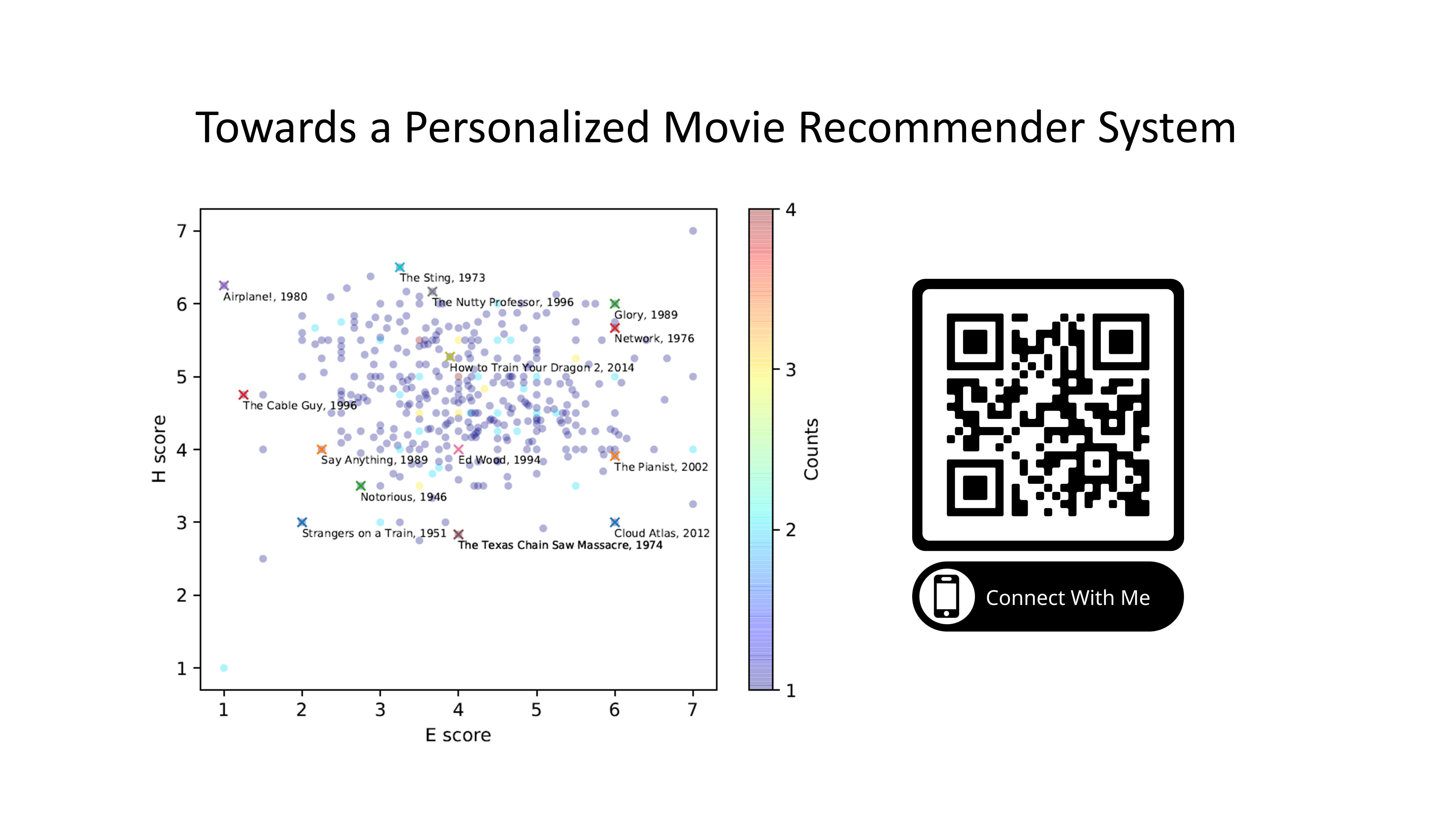Project Title: Personalised recommender system using Eudaimonic and Hedonic characteristics
Recommender systems help users to limit their many choices of items by a better understanding of users and based on their preferences. Music video streaming and movie recommender systems are two examples in which the recommending items include various modality types, such as text, auditory content, and visual (images) content. Recommender systems leverage items’ characteristics including objective and subjective features. Subjective features are a good source for making personalized and explainable recommender systems. One of the subjective features that has been introduced in this domain recently is the eudaimonic and hedonic characteristic of items. A few previous studies have demonstrated the potential of using these characteristics to study users and items. However, they are preliminary and require further investigation.
The concept of Eudaimonic-Hedonic Perception (EHP) of items has roots in positive psychology. Humans pursue well-being in different ways that have been modelled using the concepts of eudaimonia and hedonia. The eudaimonic experience is composed of two factors: (i) deeper reflection, which encompasses relatedness, central values and personal growth, and (ii) life evaluation, which encompasses the purpose of life, self-acceptance and autonomy. The hedonic experience, on the other hand, is about pure pleasure. The two factors have a very low correlation, which indicates their almost orthogonality. Users have different propensities for eudaimonic and hedonic experiences, which leads to the concept of traits in the Eudaimonic-Hedonic Orientation (EHO) model.
In this research work, we plan to investigate if using eudaimonic-hedonic qualities in recommender systems may demonstrate the potential of using these concepts in order to provide an explainable recommender system. We also plan to create a predictive model to model users and items with regard to their eudaimonic-hedonic qualities. In this section, we list a set of tentative research questions that we plan to investigate, hence they may slightly change due to the course of the research being conducted.
- RQ1 User Modelling: How to (i) use eudaimonic and hedonic characteristics for modelling the users and (ii) how to infer these characteristics from digital traces of the user.
- RQ2 Item Modelling: How to (i) use eudaimonic and hedonic characteristics for modelling the items and (ii) how to infer these characteristics from item content.
- RQ3 Recommender System: How to exploit the eudaimonic and hedonic models of items and users to generate recommendations.
In summary, this research attempts the following contributions:
- A dataset including two groups of information: (i) user-related information such as demographic information, answers to FFM personality model questions, Eudaimonic-Hedonic Orientation (EHO) questionnaire and (ii) digital traces of users such as their preference, and Eudaimonic-Hedonic Perceptions (EHP) of 10 movies they have selected.
- A trained model for inferring the EHO of users from (i) user-related information and (ii) digital traces of users.
- A trained model for inferring the eudaimonic and hedonic characteristics of items from (i) textual information such as movie subtitles, (ii) visual information extracted from movies’ trailers such as the contrast of the frames, and (iii) metadata of movies
- A recommendation approach that will match the user and item profiles and generate meaningful recommendations. Here the goal is not to beat the state-of-the-art algorithms in terms of accuracy but to be able to provide sensible recommendations that are supported by an explainable user and item model.
We started a data collection for this research. We invite you to fill out our questionnaire which takes approximately 10 minutes of your time. The questionnaire includes assessment of 50 movies that you are familiar with. The link is the following:
https://hicupexperiments.famnit.upr.si/
To know more details in this research, we invite you to read our existing publications.
E. Motamedi, “User-centric item characteristics for modeling users and improving
recommendations,” in Proceedings of the 29th ACM Conference on User Modeling,
Adaptation and Personalization, 2021, pp. 304–307. doi: https://doi.org/10.1145/3450613.3459659.
E. Motamedi and M. Tkalcic, “Prediction of eudaimonic and hedonic movie charac-
teristics from subtitles,” in Human-Computer Interaction Slovenia 2021, November
11, 2021, Koper, Slovenia, 2021, pp. 54–61.
M. Tkalcic, E. Motamedi, F. Barile, E. Puc, and M. Bitenc, “Prediction of hedonic
and eudaimonic characteristics from user interactions,” in Adjunct Proceedings of
the 30th ACM Conference on User Modeling, Adaptation and Personalization, 2022,
pp. 366–370. doi: https://doi.org/10.1145/3511047.3537656.
E. Motamedi, F. Barile, and M. Tkalcic, “Prediction of eudaimonic and hedonic orientation of movie watchers,” Applied Sciences, vol. 12, no. 19, p. 9500, 2022. doi: https://doi.org/10.3390/app12199500.
